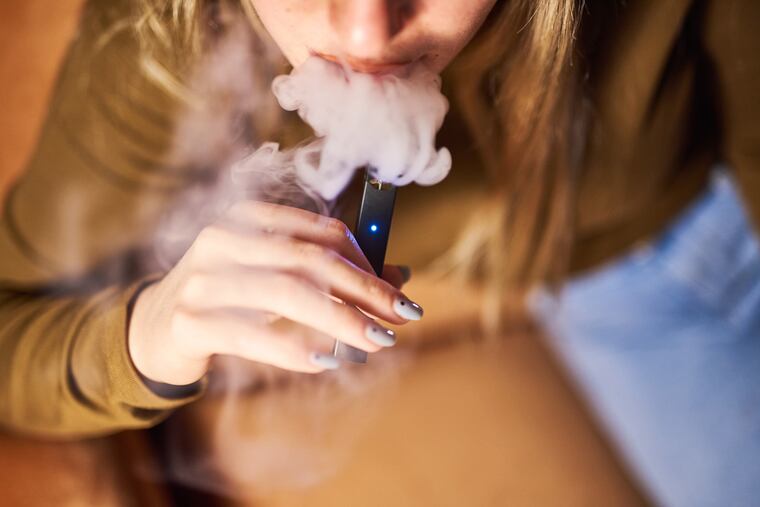Suburban DA sues Juul, saying it’s turned a ‘generation of minors into addicts’
Montgomery Co. DA Kevin Steele wants to stop the vape maker from harming minors and make the company educate the public on its dangers.

A district attorney from the Philadelphia suburbs filed suit against Juul Labs on Wednesday, accusing the vaping giant of turning “a generation of minors into addicts, constantly craving a hit of nicotine.”
Kevin R. Steele, district attorney for Montgomery County — the third most populous county in Pennsylvania — filed the suit in Norristown.
The lawsuit also named retailers Guru KOP Inc. of King of Prussia and Market 24 of Norristown, which allegedly were caught selling Juul products to minors, as defendants.
The complaint alleges that Juul and the shops violated the state’s consumer protection statute, targeting “residents, particularly minors, who have become the innocent victims of e-cigarette manufacturers, marketers and retailers, both online and in-store.”
Montgomery County appears to be the first local government in the Keystone State to sue the vape maker. Several school districts across the country have filed cases, while King County, which includes Seattle, filed a claim last month.
Nationally, about 50 suits are pending. The company is under investigation by the Food and Drug Administration, the Federal Trade Commission, and numerous state attorneys general. A multi-district case is pending in federal court in San Francisco.
The introduction of e-cigarettes by Juul and other manufacturers reportedly led to the “largest-ever recorded increase in substance abuse in the last 43 years for any adolescent substance used in the U.S.,” according to the complaint.
Juul did not respond to a request for comment.
In Pennsylvania, the Department of Health has confirmed 44 cases of vaping-associated lung injuries and suspect vaping in an additional 38 injuries. Only one death has been reported in the state. None of the cases has been directly linked to Juul.
According to department spokesperson Nate Wardle, “the vast majority of these have come from vaping illegally obtained THC products, as has been the case nationally.”
In New Jersey, the Department of Health reported in early October that the total number of confirmed and probable cases of serious lung disease in the Garden State had risen to 14. A North Jersey woman died at mid-month of a vaping-related illness. In addition, 32 reports of severe lung illness were under investigation in New Jersey.
Nationally, there are now nearly 2,000 confirmed and probable cases of severe lung illnesses in 49 states and the U.S. Virgin Islands. That included a total of 38 deaths in 24 states. None of the cases has been directly linked to Juul.
Juul controls about 75% of the e-cigarette market, and has attempted to brand itself as a safe alternative to cigarette smoking. The company used advertising methods that cigarette manufactures were banned from employing, including billboards, ads in magazines with large teen readership, and social media.
Juul suspended all broadcast, print, and digital product advertising in the U.S. last month and stopped sales of all non-mint flavors — temporarily taking off the market its mango, creme brulee, fruit medley, and cool cucumber varieties.
“This lawsuit is necessary to protect the health and well-being of Montgomery County residents, most importantly, impressionable and vulnerable minors who have been targeted by Juul, turning them into nicotine addicts and keep them coming back for the company’s own monetary gain,” Steele said in a statement.
Steele said Juul needed “to be held accountable for their actions by funding high-demand county addiction treatment services along with educational outreach programs.”
According to an investigation by Reuters published on Tuesday, Juul may have targeted teenagers through marketing candy- and fruit-flavored nicotine liquids and made them more addictive by tweaking the formulas with “nicotine salts.”
The nicotine salt formulation results in a quick burst of nicotine, which causes users to jolt when first inhaled. It makes Juul “exceedingly more addictive,” according to the complaint. It also masks nicotine’s unpleasant bitter taste.
One Montgomery County school district, Upper Dublin, was so concerned about Juul and vaping that it banned USB flash drives because some students were using their school-issued laptops to charge the look-alike vape cartridges, according to the complaint.
In Pennsylvania, consumer protection laws allow a district attorney to seek civil penalties for misleading advertising and marketing. Steele hopes to win restitution to educate county residents and provide assistance to schools to battle vaping.
The Montgomery County filing alleges that Juul committed violations of the state’s unfair trade practices and consumer protection law by misrepresenting its products as non-addictive or less-addictive nicotine-delivery systems. It says Juul also misrepresented the devices as being safer and less addictive than traditional cigarettes. It claims Juul failed to disclose the chemicals contained in its products and neglected to disclose the adverse health effects of using the products.
Steele also accused Juul of committing a public nuisance by causing the county to incur costs to remediate the company’s misconduct.
Patrick Howard, an attorney with Philadelphia firm Saltz Mongeluzzi Barrett & Bendesky, is providing assistance to the District Attorney’s Office.
“Many DAs have used private law firms to file civil cases on their behalf,” said Howard. “The DA does criminal work. These arrangements have become more common, especially with opioid litigation.”